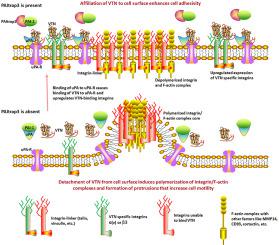当前位置:
X-MOL 学术
›
Exp. Cell Res.
›
论文详情
Our official English website, www.x-mol.net, welcomes your feedback! (Note: you will need to create a separate account there.)
Plasminogen activator inhibitor (PAI) trap3, an exocellular peptide inhibitor of PAI-1, attenuates the rearrangement of F-actin and migration of cancer cells.
Experimental Cell Research ( IF 3.7 ) Pub Date : 2020-03-30 , DOI: 10.1016/j.yexcr.2020.111987 Jihao Liu 1 , Zhuo Chen 1 , Mingdong Huang 2 , Shuzhi Tang 1 , Qianchao Wang 3 , Ping Hu 3 , Pranav Gupta 4 , Charles R Ashby 4 , Zhe-Sheng Chen 4 , Lei Zhang 1
Experimental Cell Research ( IF 3.7 ) Pub Date : 2020-03-30 , DOI: 10.1016/j.yexcr.2020.111987 Jihao Liu 1 , Zhuo Chen 1 , Mingdong Huang 2 , Shuzhi Tang 1 , Qianchao Wang 3 , Ping Hu 3 , Pranav Gupta 4 , Charles R Ashby 4 , Zhe-Sheng Chen 4 , Lei Zhang 1
Affiliation

|
BACKGROUND
The protein plasminogen activator inhibitor-1 (PAI-1), an inhibitor specific for urokinase plasminogen activator (uPA) and tissue plasminogen activator (tPA), has been shown to have a key role in cancer metastases. Currently, it is unknown as to whether the exocellular inhibition of PAI-1 can inhibit the migration of cancer cells.
METHODS
By fusing the mutated serine protease domain (SPD) of uPA and human serum albumin (HSA), PAItrap3, a protein that traps PAI-1, was synthesized and experiments were conducted to determine if exocellular PAItrap3 attenuates PAI-1-induced cancer cell migration in vitro.
RESULTS
PAItrap3 (0.8 μM) significantly inhibited the motility of MCF-7, MDA-MB-231, HeLa and 4T1 cancer cells, by 90%, 50%, 30% and 20%, respectively, without significantly altering their proliferation. The PAI-1-induced rearrangement of F-actin was significantly inhibited by PAItrap3, which produced a decrease in the number of cell protrusions by at least 20%.
CONCLUSIONS
In vitro, PAItrap3 inhibited PAI-1-induced cancer cell migration, mainly through inhibiting the rearrangement of F-actin. Overall, these results, provided they can be extrapolated to humans, suggest that the PAItrap3 protein could be used as an exocellular inhibitor to attenuate cancer metastases.
中文翻译:

纤溶酶原激活物抑制剂(PAI)trap3是PAI-1的一种细胞外肽抑制剂,可减轻F-肌动蛋白的重排和癌细胞的迁移。
背景技术已经证明蛋白纤溶酶原激活物抑制剂-1(PAI-1)是一种针对尿激酶纤溶酶原激活物(uPA)和组织纤溶酶原激活物(tPA)的特异性抑制剂,在癌症转移中具有关键作用。目前,关于PAI-1的胞外抑制是否可以抑制癌细胞的迁移尚不清楚。方法将uPA的突变丝氨酸蛋白酶结构域(SPD)与人血清白蛋白(HSA)融合,合成捕获PAI-1的蛋白PAItrap3,并进行实验以确定胞外PAItrap3是否减弱PAI-1诱导的癌细胞。体外迁移。结果PAItrap3(0.8μM)显着抑制MCF-7,MDA-MB-231,HeLa和4T1癌细胞的活力,分别抑制90%,50%,30%和20%,而不会显着改变其增殖。PAItrap3可显着抑制PAI-1诱导的F-肌动蛋白重排,从而使细胞突起数量减少至少20%。结论在体外,PAItrap3主要通过抑制F-肌动蛋白的重排来抑制PAI-1诱导的癌细胞迁移。总体而言,这些结果(只要可以推断给人类)表明,PAItrap3蛋白可用作细胞外抑制剂来减轻癌症转移。
更新日期:2020-03-30
中文翻译:

纤溶酶原激活物抑制剂(PAI)trap3是PAI-1的一种细胞外肽抑制剂,可减轻F-肌动蛋白的重排和癌细胞的迁移。
背景技术已经证明蛋白纤溶酶原激活物抑制剂-1(PAI-1)是一种针对尿激酶纤溶酶原激活物(uPA)和组织纤溶酶原激活物(tPA)的特异性抑制剂,在癌症转移中具有关键作用。目前,关于PAI-1的胞外抑制是否可以抑制癌细胞的迁移尚不清楚。方法将uPA的突变丝氨酸蛋白酶结构域(SPD)与人血清白蛋白(HSA)融合,合成捕获PAI-1的蛋白PAItrap3,并进行实验以确定胞外PAItrap3是否减弱PAI-1诱导的癌细胞。体外迁移。结果PAItrap3(0.8μM)显着抑制MCF-7,MDA-MB-231,HeLa和4T1癌细胞的活力,分别抑制90%,50%,30%和20%,而不会显着改变其增殖。PAItrap3可显着抑制PAI-1诱导的F-肌动蛋白重排,从而使细胞突起数量减少至少20%。结论在体外,PAItrap3主要通过抑制F-肌动蛋白的重排来抑制PAI-1诱导的癌细胞迁移。总体而言,这些结果(只要可以推断给人类)表明,PAItrap3蛋白可用作细胞外抑制剂来减轻癌症转移。



























 京公网安备 11010802027423号
京公网安备 11010802027423号